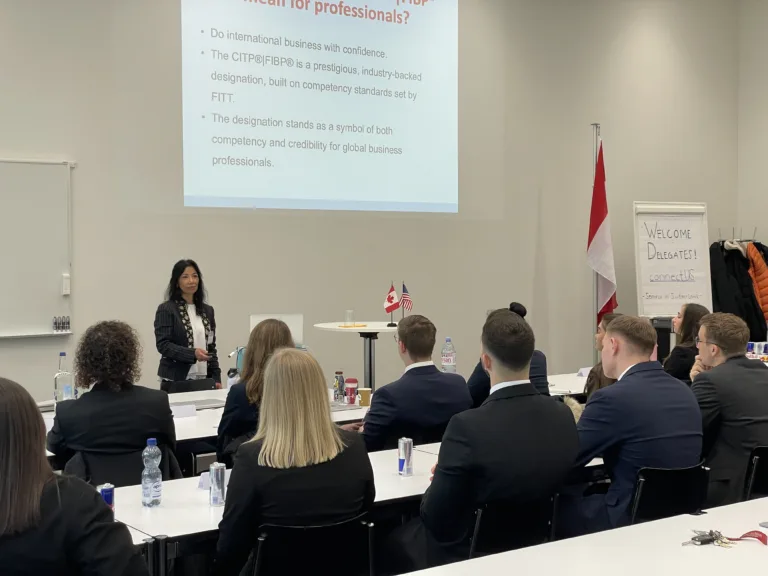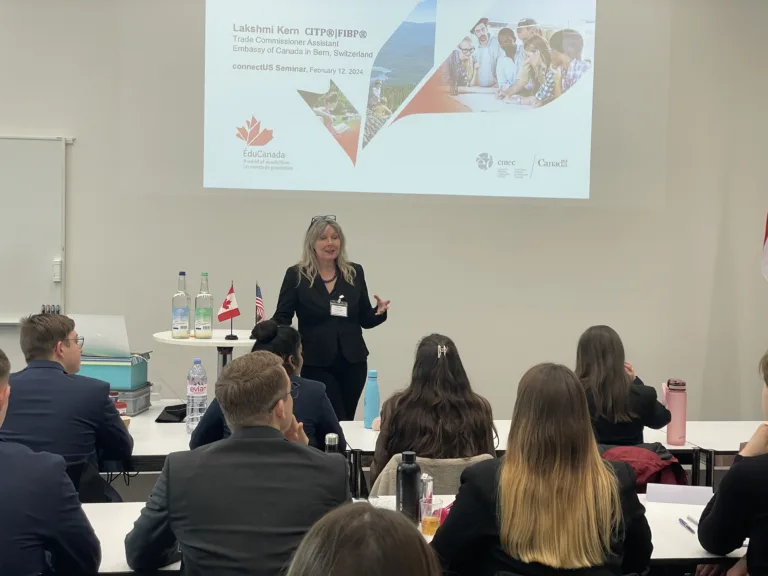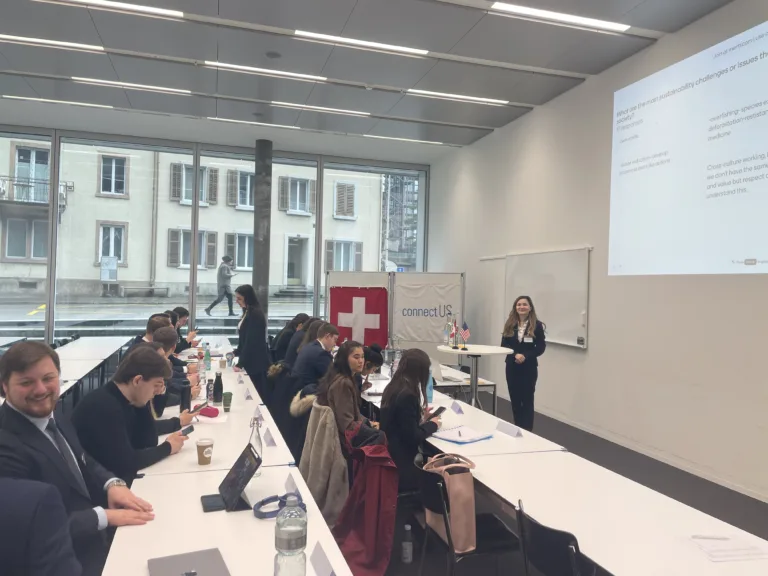
After several months of intense planning, we are delighted to announce the start of our Seminar in Switzerland, held in Olten. The seminar began with introductions from the Seminar in Switzerland Responsibles, as well as from Michele Canonico, Head of the Services School of Business at the FHNW, setting the perfect tone for an enlightening week ahead.
We also welcomed our Joint Platinum Sponsor, CEO Marc Blaser of Blaser Swisslube. We are grateful for their longlasting contribution in bringing this event to life.
Each day of the seminar will be packed with knowledge and insight, and our delegates will be preparing a blog post to capture the essence of the discussions and presentations. These posts will be published on the website, giving everyone the chance to share our journey of learning and discovery.
Stay tuned for our first two blog posts. They will cover the highlights and key takeaways from the opening day of the Seminar in Switzerland. We are excited to share this incredible experience with you and look forward to engaging with our audience through these daily insights.


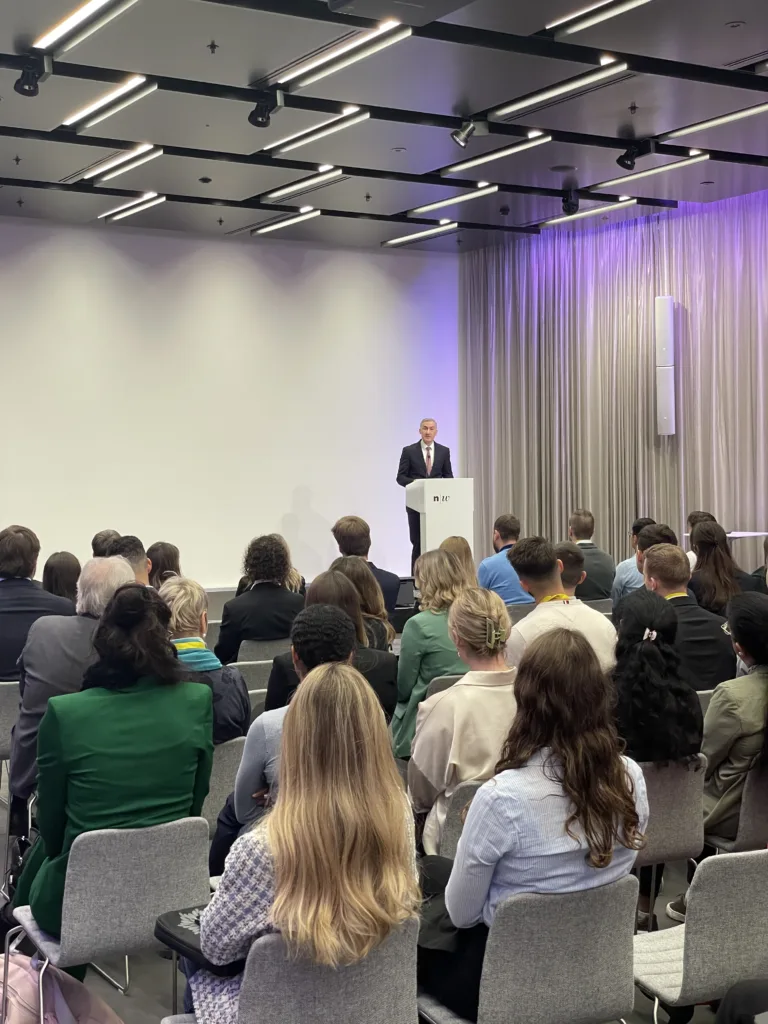

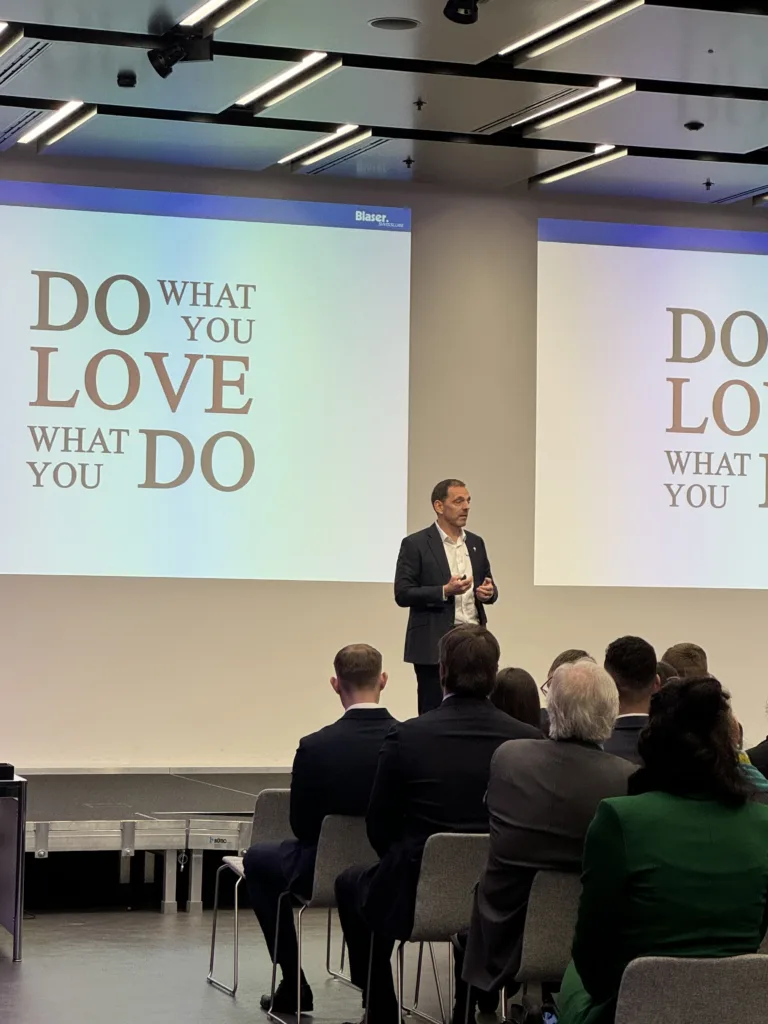



Venturing into the Swiss market poses unique challenges for Canadian companies, not only by logistical hurdles but also by cultural and legal frameworks. One of the primary obstacles is the language barrier in the German and Italian-speaking regions of Switzerland. This linguistic diversity complicates business communications and marketing efforts, requiring an in-depth understanding of the culture of the different parts of the country. The core of any successful venture lies in its people. Companies would have to invest in multilingual staff or services to bridge this gap, which is a considerable commitment just to enter the new market.
Another significant challenge is the time zone difference, with Switzerland operating several hours ahead of Canada. This complicates real-time communication and would cause unconventional work hours for one of the two parties. This often hinders Swiss companies from doing international business in favor of engaging with more local companies.
In addition to that, moving into the Swiss market requires a thorough understanding of the local tax system and tariff regulations, which can be considerably different depending on the Canton where the company is looking to do business. The Swiss market is known for its intricate rules on taxation and imports, potentially leading to costly mistakes for companies unfamiliar with the legal landscape. Not understanding this complexity gets Canadian companies to hesitate to take action in the unknown market.
Despite these challenges, the Swiss market offers substantial opportunities for Canadian companies, primarily due to its sophisticated financial market.
Known for innovation and efficiency, Switzerland provides a secure foundation for business expansion. Its reputation as a global financial hub further enhances its appeal for companies seeking to reach new customers. This robust economic environment also makes the country a magnet for businesses looking to secure a foothold in a forward-thinking market.
Additionally, Switzerland boasts a highly educated workforce, thanks to its high-quality universities and focus on vocational training. The strategic location in the center of Europe also offers good access to European markets, providing Canadian companies a gateway to expand their reach not only within Switzerland but also across the EU.
The Canadian Trade Commissioner Service (TCS) plays a crucial role in helping Canadian businesses to overcome these hurdles they may encounter when planning to expand inte the Swiss market.
Central to the services provided by the TCS is access to an extensive network of trade commissioners. These professionals are certified International Trade Personnel and deeply familiar with the Swiss business environment. This ensures that they are well-equipped to guide Canadian businesses through the international expansion.
The TCS assists Canadian firms by delivering key insights into the Swiss market, including trends, regulatory considerations, and cultural differences that are crucial for an effective expansion. They are primarily focused on supporting small and medium enterprises.
Moreover, the TCS plays a fundamental role in connecting Canadian companies with local key contacts. These connections range from potential business partners to local authorities, significantly smoothing the path for Canadian enterprises entering this new market.
A standout feature of the TCS’s offerings includes arranging for experts to attend meetings to help overcome language barriers and other cultural differences. This ensures clear and effective communication, and therefore successful negotiation.

Expanding into Switzerland presents challenges, but also holds great potential for Canadian companies. The Canadian Trade Commissioner Service offers vital support, helping businesses overcome barriers and find their footing in a new market. This collaboration is key to building bridges between the people behind Canadian companies and the Swiss market, providing the necessary tools and connections for success.
Monday, February 12, 2024, when Aurelie Litynski, a leading expert on positive work environments, took the stage. Her words about the role of happiness in the workplace were not only inspiring but also a wake-up call. In this blog, we share the fascinating insights Litynski shared with us and how they have changed our perspective on happiness at work.
Litynski made it clear that happiness at work is far more than a nice-to-have add-on. It is a prerequisite for mental health and peak performance. Despite initial skepticism from some companies, Litynski emphasizes that happiness should be integrated into every area of business. Her view that happiness is a “superpower” and her conviction that engagement without happiness is possible but ultimately unfulfilling were particularly powerful.
Litynski presented two provocative theses: “Most of the things we think make us happy don’t make us as happy as we think,” and “Happiness at work is not what you think about your job, it’s how you feel about it. These statements challenge our conventional views and shift the focus to the real sources of happiness.
Interestingly, Litynski explained how our brain’s amygdala tends to store negative experiences more prominently. The solution? Actively seek out daily moments of happiness to boost positive energy in the body and rebalance this imbalance. One tip she offered was to write down your daily moment of happiness so that the good feeling lasts longer.
Litynski offered concrete strategies for improving focus and creating a positive work culture. These include “making time for traction”, “time boxing”, and “hack back external triggers”. Her “Positive Work Culture Toolbox” includes six key components:
self-awareness: knowing your strengths, emotions, behaviors, and boundaries.
lead with your heart: not just your head
give and embrace feedback: Use the FBI (Feeling, Behavior, Impact) model for constructive criticism.
excellent listening skills: Practice active listening and empathy
build relationships: Through 1:1 conversation, “happiness talks,” and networking.
celebrate small wins: Recognize and celebrate progress.
A central theme of Litynski’s presentation was the notion that happiness is a personal responsibility. This perspective emphasizes that our professional and personal well-being is in our hands and that creating a positive work environment requires a collaborative effort.
Aurelie Litynski’s findings and recommendations, which focus on increasing happiness in the workplace, can be most easily categorized under the P “People” within the three-P structure. Positive psychology, the science of well-being and human strengths, plays a central role in fostering healthy, resilient, and satisfied communities. It offers tools and approaches that not only increase individual happiness but also promote positive social relationships and a supportive sense of community in the workplace.
Aurelie Litynski’s insights have not only deepened our understanding of the importance of happiness in the workplace but have also provided practical approaches to fostering a positive work environment. The realization that happiness is a personal responsibility has fundamentally changed the way we look at professional and personal well-being. Inspired by Litynski’s words, there is a strong motivation to apply what has been learned to both the work environment and everyday personal life to live a more fulfilling life overall.
In a world often characterized by stress and hectic pace, Aurelie Litynski reminds us that the pursuit of happiness in the workplace is not a luxury, but a necessity. Her message is clear: by integrating happiness into your professional life, you can not only improve your performance but also achieve a deeper sense of satisfaction and well-being. It’s time to unleash the hidden superpower of happiness and transform workplaces into sources of inspiration and positive change.

